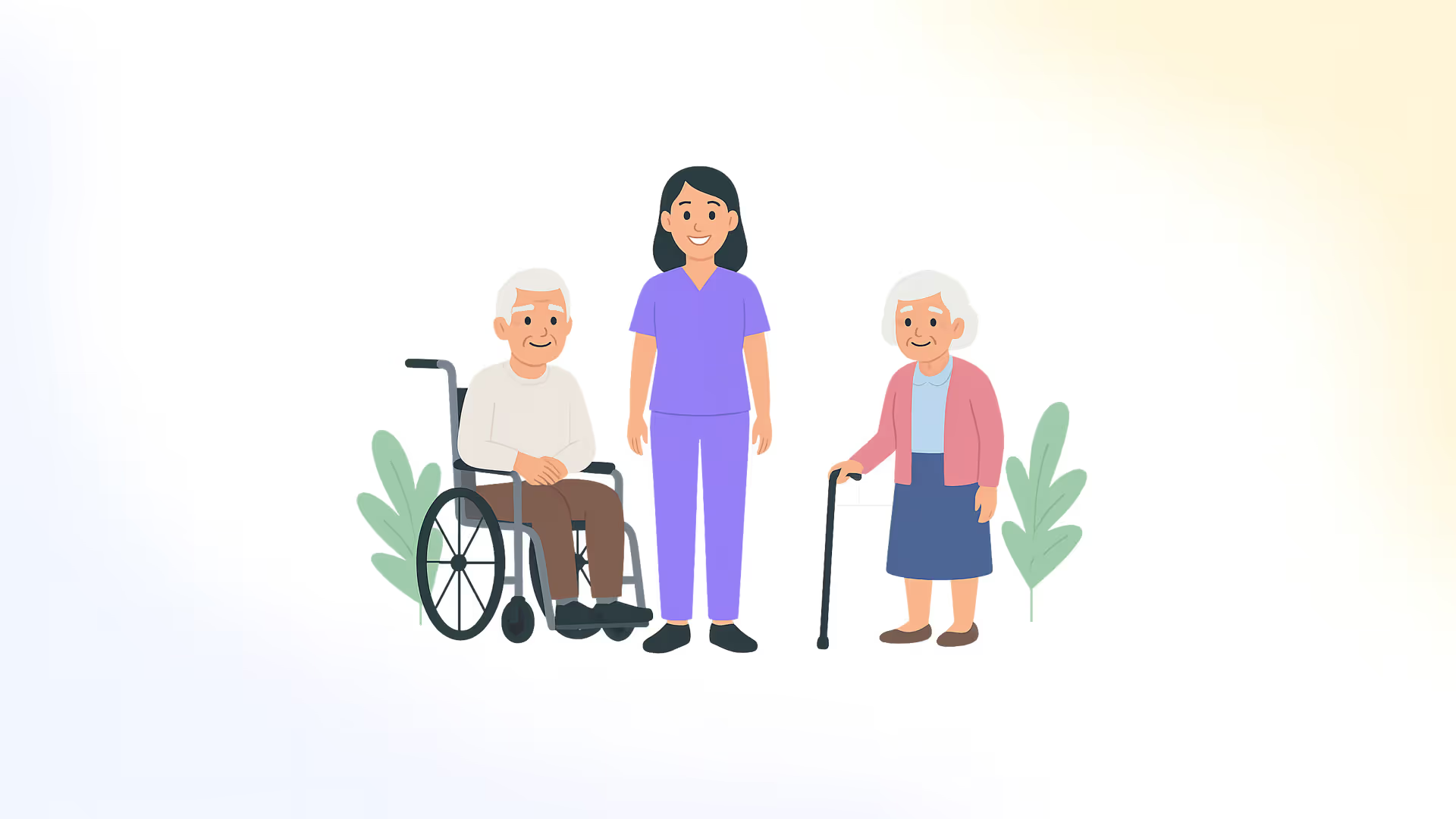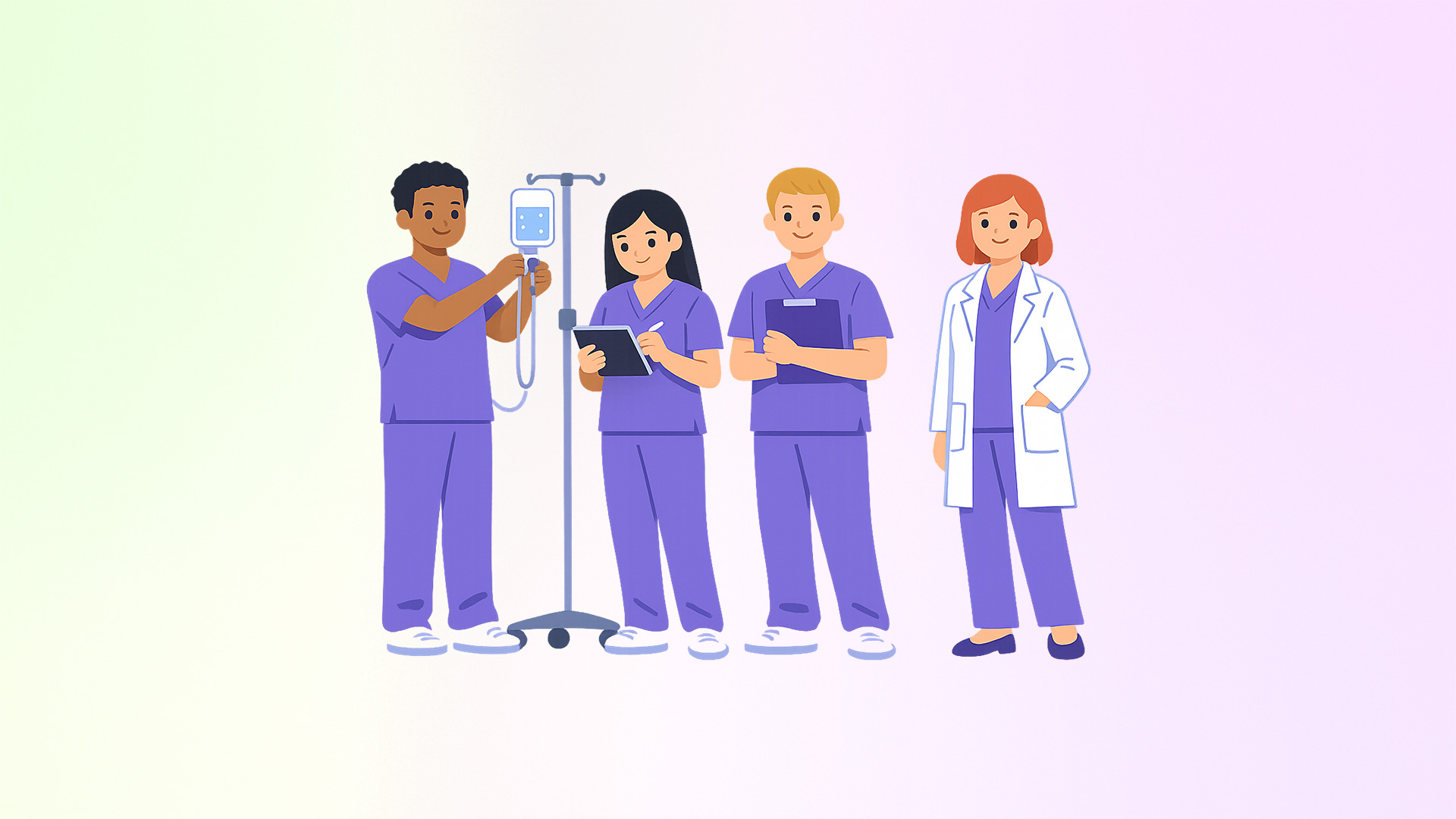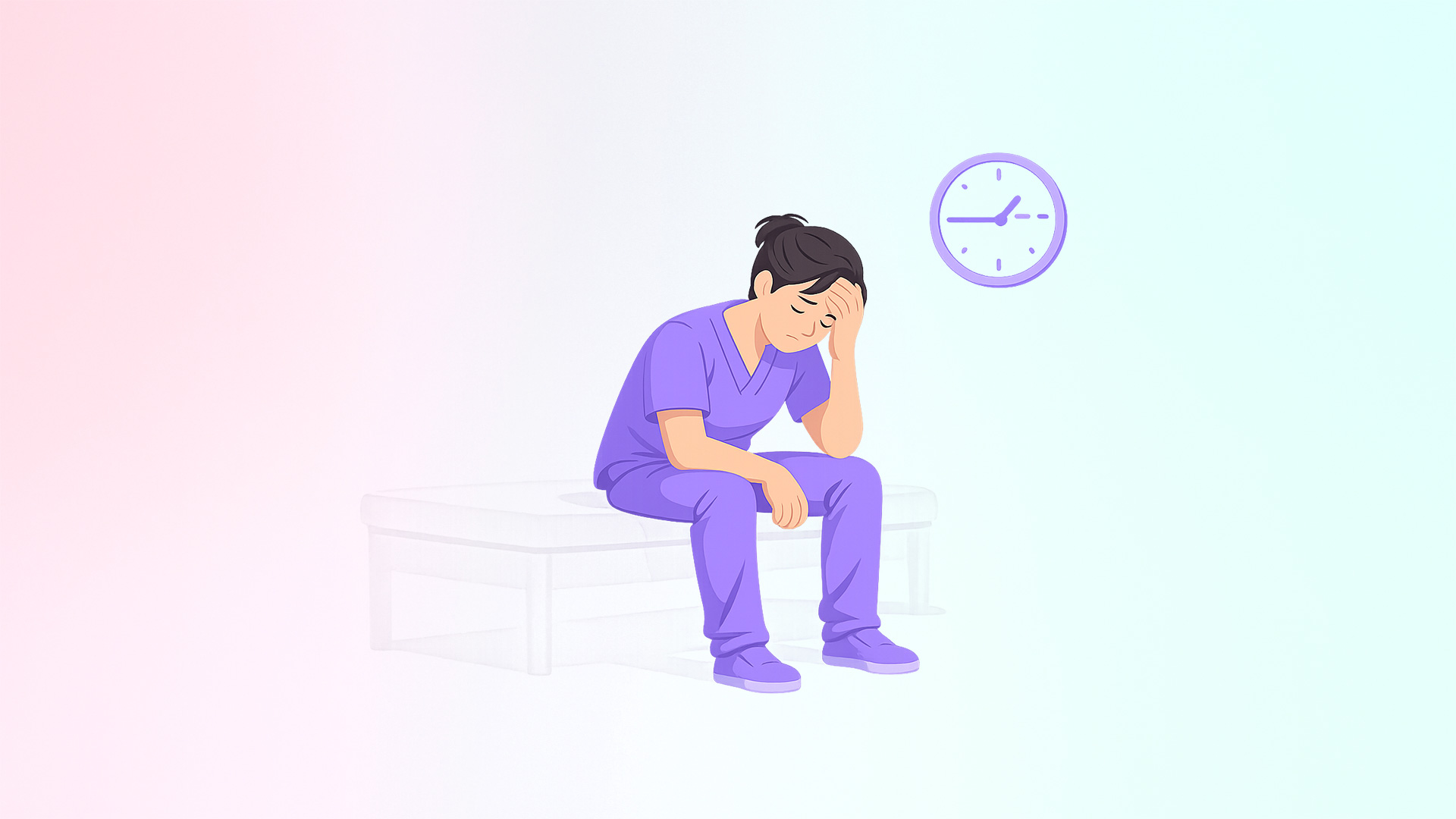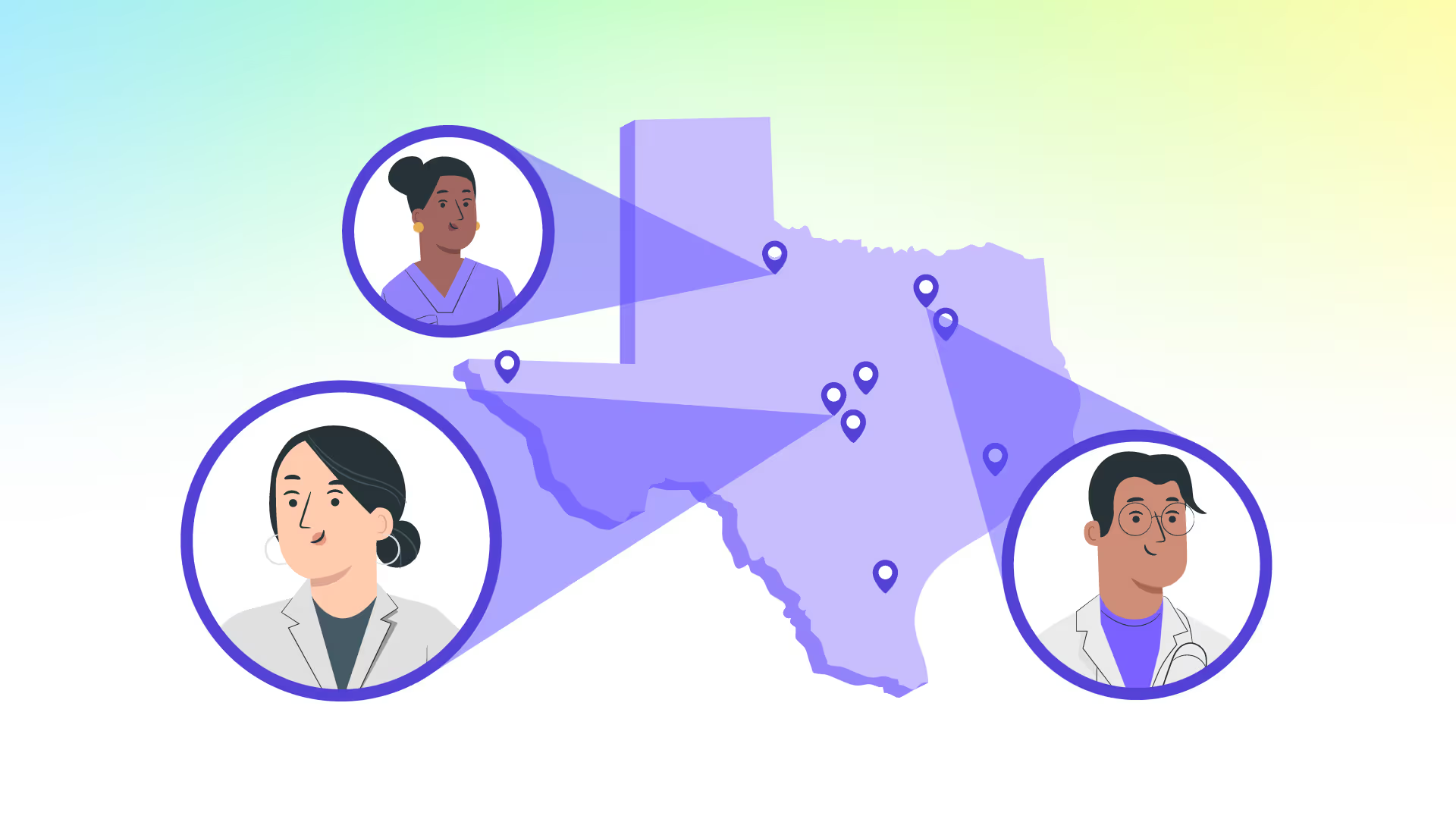A geriatric psychiatry rotation is a supervised clinical training experience where NP students learn to diagnose, treat, and manage the mental health conditions of older adults, including dementia, late-life depression, and anxiety. These rotations provide hands-on practice in psychiatric evaluations, safe medication management, caregiver education, and comprehensive care, making them an essential step for graduation, certification, and future clinical practice.
TL;DR – Geriatric Psychiatry Rotations for NP Students
- Geriatric psychiatry rotations prepare NP students to care for older adults facing conditions like dementia, late-life depression, and anxiety.
- With only 1,429 board-certified geriatric psychiatrists in the U.S., PMHNPs play a critical role in filling the gap in mental health care for older adults.
- These rotations build essential skills in diagnosis, safe medication management, caregiver education, and comprehensive care.
- Finding a preceptor on your own is challenging—most students face delays, unanswered outreach, and complex paperwork.
- NPHub connects NP students with vetted geriatric psychiatry preceptors so you can create your free account today and secure a rotation that keeps you on track for graduation.
The Growing Need for Geriatric Mental Health Training
With the U.S. population rapidly aging, older adults are facing a sharp rise in mental health conditions like dementia, late-life depression, and anxiety. Yet, the workforce isn’t keeping pace.
As of 2023, there were only 1,429 board-certified geriatric psychiatrists in the entire country and this shortage means most mental health care for older adults falls to non-geriatric specialists like primary care providers, general psychiatrists, and increasingly, PMHNPs.
Knowing this, training future clinicians in the principles of geriatric psychiatry is critical. It ensures they’re not only prepared for direct psychiatric care, but also ready to lead, educate, and support colleagues across primary care, gerontological nursing, and behavioral health.
For NP students, this makes geriatric psychiatry rotations more than a graduation requirement—they’re a chance to practice real-world clinical skills you’ll use every day: managing complex diagnoses, evaluating patients across settings like nursing homes and outpatient clinics, and coordinating care with families and caregivers. These are the rotations where confidence is built and clinical practice becomes more than theory.
In this guide, we’ll cover what geriatric psychiatry is and the challenges you’ll encounter in training, the role of PMHNPs in supporting older patients and their families, why rotations in this specialty matter for your career growth and how to find the right preceptor without wasting months searching on your own
If you’re ready to prepare for success in geriatric mental health care, let’s start with the basics.
Geriatric Psychiatry 101
Geriatric psychiatry is one of the youngest medical specialties in the United States but it has quickly become one of the most critical.
This field focuses on the unique mental health issues of older adults, including late-life depression, dementia, anxiety, and other emotional disorders. With approximately 15% of people over 60 experiencing some type of mental health condition, a number that rises as people age, there is an urgent need for clinicians prepared to care for this population.
Unlike general psychiatry, geriatric psychiatry rotations prepare students to look at the whole picture of a patient’s life. Clinical training emphasizes how physical health care, cognitive decline, functional status, and even social and family dynamics affect diagnosis and treatment.
That’s why this specialty asks students to see older patients through the biopsychosocial lens, where every case is unique, and variability in older people is far greater than the stereotype of a homogenous elderly population.
For students in collegiate nursing education programs, this means that rotations in geriatric psychiatry provide exposure to some of the most challenging and rewarding aspects of psychiatric care like:
- Polypharmacy and safe medication management
- Cognitive and behavioral health evaluations
- Family and caregiver involvement and,
- Care across diverse settings.
Ultimately, geriatric psychiatry rotations are about more than mastering medications and diagnosis, they’re about developing respect, empathy, and leadership skills to support patients and families with dignity.
For NP students, the challenge isn’t deciding whether these rotations matter (they do), it’s finding the right preceptor. That’s why at NPHub, we connect students with vetted geriatric psychiatry preceptors who are ready to teach.
You can create your free account today and take the first step toward securing a rotation that prepares you for real-world practice. Next, let’s look at the unique role PMHNPs play in caring for older adults, and why these skills are so essential for your future clinical practice.
The Role of PMHNP Students in Caring for Older Adults
As the U.S. population continues to age, psychiatric mental health nurse practitioners (PMHNPs) are stepping into leadership roles in geriatric psychiatry.
These clinicians play a vital part in bridging the gap between limited specialists and the growing number of older adults facing mental health conditions.
PMHNPs who focus on geriatric mental health support older patients and their families through some of life’s most difficult challenges.
They provide care for age-related mental health issues such as grief, anxiety, depression, and fear of death, as well as cognitive conditions like Alzheimer’s disease and dementia. With longer life expectancy and a rapidly growing older population, the demand for providers skilled in these areas has never been higher. In fact, cases of Alzheimer’s disease alone are expected to double between 2010 and 2030.
In clinical practice, PMHNPs take on responsibilities that go beyond diagnosis. They:
- Conduct psychiatric evaluations to identify late-life depression, delirium, and other cognitive or emotional disorders.
- Manage medications safely in patients already coping with polypharmacy and complex physical health care needs.
- Educate patients and families, helping them understand conditions and treatment plans while also providing emotional support.
- Develop and adjust treatment strategies that integrate psychiatric care with broader comprehensive care across primary care, nursing homes, and hospital settings.
For NP students, rotations in this specialty highlight how geriatric psychiatry is about more than treating symptoms, it’s about promoting well-being, health promotion, and resilience for patients and their caregivers.
These are the rotations where you practice being both a clinician and a guide, preparing you to participate in leadership roles within psychiatry, gerontological nursing, and behavioral health.
If you’re preparing for this specialty, the right preceptor makes all the difference. At NPHub, we connect NP students with vetted geriatric psychiatry preceptors so you can gain the hands-on training you need. Create your free account and take the first step toward building the skills that matter most for your future practice.
Why Geriatric Psychiatry Rotations Matter for NP Students
For many NP students, it’s easy to see clinical rotations as another requirement on the path to graduation. But when it comes to geriatric psychiatry rotations, the value goes far deeper. These are the rotations where you gain real-world clinical training in some of the most complex cases in mental health care, and where you learn to balance psychiatric, physical, and social needs in ways that will define your practice.
During these rotations, students develop:
- Diagnostic reasoning skills by working with older patients whose symptoms overlap across physical illness, cognitive decline, and psychiatric conditions.
- Confidence in managing complex treatment plans, including safe use of medications in patients already dealing with multiple prescriptions.
- The ability to link theory to practice, turning what you’ve learned in collegiate nursing education into direct care strategies that improve patient and family outcomes.
This is also where the role of a strong preceptor becomes clear. A great preceptor not only ensures your hours count toward graduation but also mentors you through the nuances of caring for older patients—from handling sensitive conversations about grief and aging to navigating care transitions between hospitals, nursing homes, and outpatient clinics.
With the right preceptor, your rotation becomes more than a requirement—it becomes the foundation for your clinical practice, your confidence as a provider, and your ability to treat older adults with skill and compassion.
At NPHub, we make it easier to find that right preceptor so you can stay focused on learning instead of worrying about delays. Create your free account and discover vetted geriatric psychiatry preceptors who can help shape your success.
But what happens if you try to manage the search on your own? Let’s look at what NP students typically face when they take the DIY route and why it can feel overwhelming.
How to DIY Your Geriatric Psychiatry Rotations Search
For most NP students, the hardest part of preparing for geriatric psychiatry rotations isn’t the coursework—it’s finding a preceptor.
On paper, it sounds simple: reach out to providers, explain your program’s requirements, and secure a site. In reality, the process can take weeks or even months, often with little to show for your effort.
Many students start with cold calls to nursing homes, hospitals, or outpatient clinics, only to be told that the site doesn’t take students or that they’re “not set up” for preceptorships. Emails often go unanswered, and when replies do come, they can be rejections due to lack of capacity, credentialing issues, or burnout among providers.
Even if you do find someone interested, the logistics can be overwhelming. You’re often responsible for:
- Coordinating paperwork such as site agreements, liability insurance, and official transcripts.
- Ensuring the preceptor meets both school and state requirements under the consensus model and APRN regulation.
- Tracking down signatures, faculty approvals, and institutional resources to get your clinical training approved.
All of this happens while you’re still working, studying, and trying to keep your life in balance. The result? Many students face delayed clinical practice, extra tuition fees, and months of unnecessary stress simply because the system isn’t built to support them.
That said, if you want to try the DIY route, here are five insights that can make your search a little more effective:
- Start with your school’s network. Faculty members, alumni, and university partnerships are often underused resources. Even if they can’t guarantee placement, they may be able to connect you with clinicians who’ve precepted before.
- Target the right settings. Nursing homes, outpatient geriatric psychiatry clinics, and community mental health centers are more likely to accept students than large hospital systems with strict credentialing.
- Come prepared with paperwork. Having your CV, rotation requirements, liability insurance, and school forms ready shows professionalism and makes it easier for a provider to say yes.
- Be clear in your ask. Instead of vague emails like “Do you take students?”, outline the exact number of hours you need, your timeline, and what skills you hope to gain (e.g., working with dementia, managing polypharmacy, caregiver education).
- Stay persistent and organized. Most students hear “no” far more than “yes.” Track your outreach in a spreadsheet and follow up professionally—sometimes it’s the second or third email that gets a reply.
Even with these strategies, many students still struggle to secure a rotation. That’s not because they’re unprepared, it’s because the system is stacked against them.
For rotations as critical as geriatric psychiatry, where exposure to dementia care, late-life depression, and caregiver involvement can shape your entire career, losing that time is especially frustrating.
So what’s the alternative? Instead of chasing unanswered emails, many students are turning to preceptor matching services designed specifically for NP programs like NPHub
Preceptor Matching Services For Geriatric Psychiatry Nurse Practitioners
If you’ve tried the DIY approach, you already know how draining the process can be. Cold calls, unanswered emails, and piles of paperwork often leave students feeling stuck and worse, at risk of delayed graduation.
When it comes to a specialty as important as geriatric psychiatry rotations, you shouldn’t have to sacrifice months of progress just to find a placement.
That’s where preceptor matching services come in. Instead of navigating the search on your own, these services connect NP students directly with providers who are ready to teach. The difference? You spend less time on logistics and more time preparing for the clinical training that will shape your career.
At NPHub, we’ve built a platform specifically designed to solve this problem for NP students. Here’s what sets us apart:
- Every preceptor in our network is reviewed for availability, specialty fit, and willingness to teach. That means you’re not just handed a list—you’re matched with providers who are ready to support your success.
- We confirm your rotation with your school from the beginning, so you can be confident that every clinical hour you complete will count toward graduation and certification.
- From site agreements to insurance forms, our team takes care of the details that usually take students weeks to resolve.
- Instead of spending months searching, you gain peace of mind knowing your rotation is secured. That frees you to focus on building the skills that matter: managing dementia, supporting caregivers, and treating complex psychiatric conditions in older adults.
At the end of the day, you shouldn’t have to fight the system just to complete your program. With NPHub, you have a smarter, faster way to secure a placement and keep your education on track. Create your free account and let us help you find the right geriatric psychiatry preceptor with confidence.
Next, let’s bring everything together and look at how you can prepare for success in your geriatric psychiatry rotation and beyond.
Preparing for Success in Geriatric Psychiatry Rotations
Completing a geriatric psychiatry rotation is an opportunity to step into one of the most meaningful and impactful areas of mental health care. With an aging population and the need for skilled providers grows, PMHNPs who are trained to care for older adults will be at the forefront of improving access, guiding families, and shaping the future of psychiatric care.
These rotations prepare you to do more than diagnose and prescribe, they help you build the confidence, empathy, and leadership skills that define advanced practice nursing. You’ll gain firsthand experience managing late-life depression, dementia, grief, and complex treatment plans, while also learning how to support caregivers and coordinate across multiple care settings.
Your path to becoming a confident, prepared provider starts now. Create your free account and secure a geriatric psychiatry preceptor who will help you graduate on time, and prepare you for a career making a difference in the lives of older adults and their families.
Frequently Asked Questions: Geriatric Psychiatry Rotations for NP Students
1. What is a geriatric psychiatry rotation?
A geriatric psychiatry rotation is a supervised clinical training experience where NP students work with older adults facing mental health conditions such as dementia, late-life depression, and anxiety. Under the guidance of a qualified preceptor, students practice psychiatric care, including evaluation, medication management, and family education.
2. Why are geriatric psychiatry rotations important?
They expose NP students to some of the most complex cases in mental health care. Older adults often experience overlapping physical health care needs, emotional disorders, and cognitive changes. These rotations give you confidence in managing real-world cases that require both skill and compassion.
3. What skills will I develop during a geriatric psychiatry rotation?
Students strengthen diagnostic reasoning, safe medication management, communication with families and caregivers, and the ability to create comprehensive care plans. You’ll also learn to navigate care across nursing homes, hospitals, and outpatient clinics.
4. Do all NP programs require a geriatric psychiatry rotation?
Not all programs require it, but most include clinical practice in older adult mental health care as part of their psychiatric track. Even if it’s optional, many students choose it because of its value in preparing for leadership roles and diverse practice settings.
5. How hard is it to find a geriatric psychiatry preceptor on my own?
It can be very challenging. Many clinics don’t advertise student opportunities, and paperwork can take weeks. Students often face delayed rotations when relying on cold calls and emails. That’s why services like NPHub exist—to connect you with vetted preceptors quickly.
6. Do rotations in geriatric psychiatry count toward my required clinical hours?
Yes. As long as the preceptor and site meet your school and state requirements under the consensus model and APRN regulation, your hours will count toward graduation and certification.
7. What conditions will I typically see during this rotation?
You’ll likely work with patients experiencing dementia, Alzheimer’s disease, late-life depression, anxiety, grief, delirium, and substance use disorders. Exposure to these conditions prepares you to treat a wide range of mental health issues in older adults.
8. Can PMHNPs specialize in geriatric mental health after graduation?
Yes. Many PMHNPs choose to sub-specialize in geriatric psychiatry or work in settings that primarily serve older patients. Additional continuing education, certification, and professional development can help you deepen your expertise in this area.
9. How do I prepare before reaching out to a potential preceptor?
Have your CV, liability insurance, rotation requirements, and school forms ready. Being prepared shows professionalism and makes it easier for providers to say yes. Clear communication about your goals (e.g., experience with dementia or caregiver support) can also make you stand out.
10. How does NPHub help with geriatric psychiatry rotations?
Instead of handling the search, paperwork, and site approvals on your own, NPHub matches you with vetted preceptors who are ready to teach. We confirm school compliance, manage logistics, and ensure your clinical practice hours count. This way, you can focus on gaining hands-on experience.
Key Definitions: Geriatric Psychiatry Rotations and Clinical Training
- Geriatric Psychiatry
A medical specialty focused on diagnosing, treating, and managing mental health conditions in older adults, including dementia, late-life depression, anxiety, and grief. - Geriatric Psychiatry Rotation
A supervised clinical practicum where NP students gain hands-on experience providing psychiatric care to older patients across settings such as nursing homes, hospitals, and outpatient clinics. - Polypharmacy
The simultaneous use of multiple medications, common among older adults. In clinical practice, this requires careful management to avoid harmful interactions and ensure safe treatment. - Late-Life Depression
A form of depression that occurs in older adults, often complicated by coexisting physical health care issues, grief, or cognitive decline. It is a central focus in geriatric mental health training. - Cognitive Disorders
Conditions such as dementia, Alzheimer’s disease, or delirium that affect memory, thinking, and behavior in older patients. These are key challenges in geriatric psychiatry rotations. - Caregiver Involvement
The active role families and caregivers play in supporting older adults. In rotations, NP students learn how to educate and collaborate with caregivers to create effective, comprehensive care plans. - Clinical Practicum
A required training program where NP students apply classroom knowledge in real-world settings, building essential skills in diagnosis, evaluation, and treatment under the supervision of a qualified preceptor. - Advanced Practice Registered Nurse (APRN)
A nurse who has completed graduate-level collegiate nursing education, passed licensure exams, and achieved certification to practice independently in a specialty such as psychiatry. - Preceptor
A licensed clinician (such as a PMHNP, psychiatrist, or other provider) who supervises NP students during clinical training, guiding them through direct patient care while ensuring compliance with university and state requirements. - Comprehensive Care
An approach that integrates psychiatric, physical, and social support for patients. In geriatric psychiatry, this includes medication management, psychotherapy, caregiver education, and coordination across healthcare teams.
About the author
- NPHub Staff
At NPHub, we live and breathe clinical placements. Our team is made up of nurse practitioners, clinical coordinators, placement advisors, and former students who’ve been through the process themselves. We work directly with NP students across the country to help them secure high-quality preceptorships and graduate on time with confidence. - Last updated
October 29, 2025 - Fact-checked by
NPHub Clinical Placement Experts & Student Support Team - Sources and references
- https://link.springer.com/article/10.1007/s40596-025-02126-6
- https://radiusstaffingsolutions.com/geriatric-nurse-practitioner-career-path/
- https://www.healthecareers.com/career-resources/nurse-career/6-subspecialties-for-psychiatric-nurse-practitioners
- https://nursing.sandiego.edu/blog/the-role-of-a-psychiatric-mental-health-nurse-practitioner-pmhnp
- https://www.nphub.com/blog/cost-delaying-np-graduation
- https://www.nphub.com
Find a preceptor who cares with NPHub
Book a rotation.webp)








.webp)


.webp)



%20(3)%20(2).svg)
.webp)